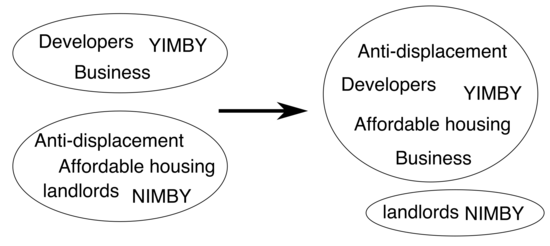Realigning Housing Coalitions |
October 8th, 2019 |
| housing |
Developer / Pro-business / YIMBY: make it easier to build more housing. Allow higher densities, more subdivision, and smaller units. Lower affordable housing minimums, lower parking minimums, lower anything else that acts as a tax on development.
Anti-displacement / Affordable housing / Landlord / NIMBY: new housing is luxury housing, they're building units that are too small for families, this construction only benefits the small slice of people rich enough to afford it. There's already too much traffic, not enough parking, and construction means tree removal. Stop condo conversions and evictions. Impose a transfer tax to stop speculators.
This division has been shifting some, however, with the development of density bonus programs. The idea is, developers are allowed to build more units than zoning would normally allow, but they also have to make a larger fraction of them available below market rate. For example, an affordable housing bonus density program could apply to a property where current zoning would allow eight $1M units and two affordable $400k units, and offer an option of ten $1M units and ten affordable $400k units. Programs like this have several advantages:
The number of new affordable units built is higher than it would be under either current zoning or a new zoning that simply increased the required fraction of affordable units.
The total number of units available, regardless of affordability, is higher, taking pressure off the market elsewhere.
The housing actually gets built, because construction is profitable.
Other programs along these lines could include:
Remove parking minimums for new housing that's near transit, allowing more housing to be built in a way that doesn't cause as much traffic.
Remove parking minimums for new housing that isn't entitled to street parking and pre-pays for decades of public transit passes
Raise the cap on on floor-area-ratio more than the cap on allowed units, leading developers to build more family-sized units.
For buildings with tenants, allow higher density for landlords that retain their tenants while rebuilding, providing interim housing and similarly affordable units in the new building.
These have the same structure, allowing higher density in exchange for improvements elsewhere: affordability, traffic, parking, number of family-sized units, displacement. A coalition along these lines could be pretty broad, and include most of the the anti-displacement, affordable housing, developer, business, and YIMBY camps. I'm sad that Cambridge's affordable housing overlay proposal has been put on hold after only getting 5/9 councillors when it needed 6/9, but I think future efforts in this direction are very promising.
Update 2019-10-08: thanks to Jim for pointing out that the current "don't build" coalition includes landlords; added to the post.
Comment via: facebook, lesswrong, substack
